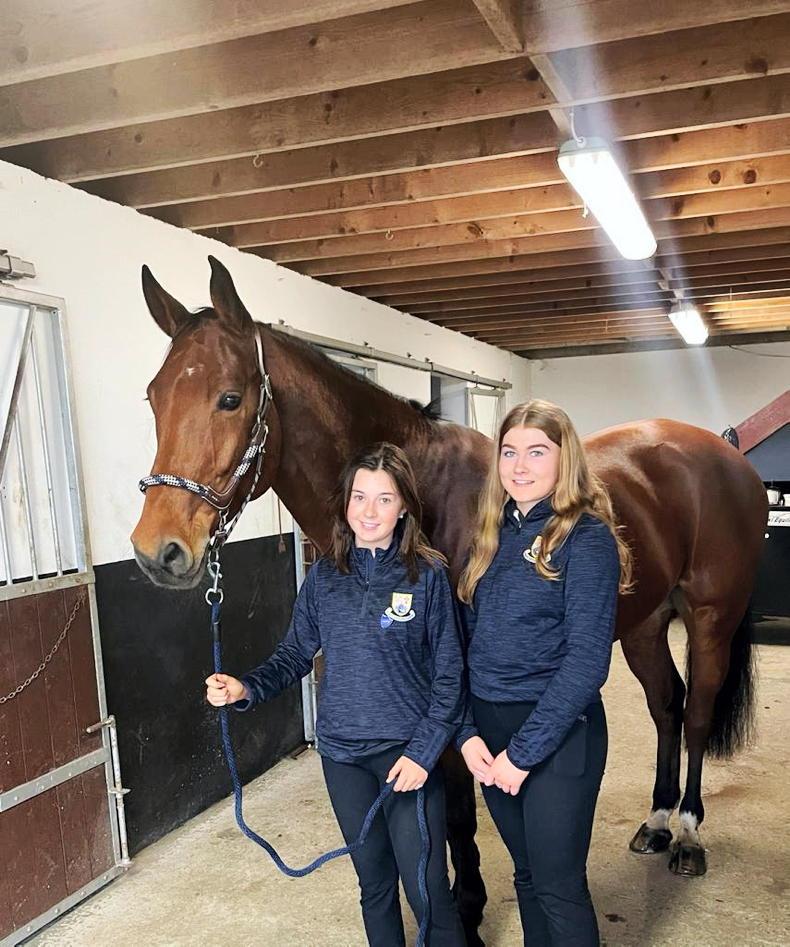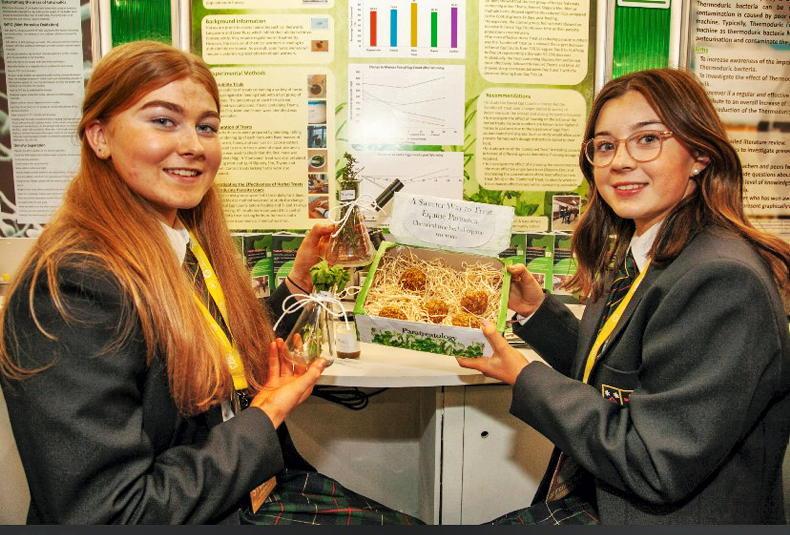Worms would not be many 16-year-old girls’ inspiration. It’s safe to say most horsey girls are happy enough in their joddies and boots, down the yard with their four-legged friend, jumping poles and cantering fields.
But not Moate Community School students Aine Shortall and Kate Whyte. They are equestrians who know that riding is often the easier part of horse care, and it’s keeping them healthy that can be tricky.
Wormer resistance
Like many other animals, horses are prone to worm burdens. It was this very problem that inspired transition year students Aine and Kate to develop a product to try to tackle the problem head-on.
“Horses are prone to several parasites such as redworm, lungworm and liver fluke which inhibit their ability to thrive,” Kate explains. “Consequently, they require regular worming. The overuse of chemical wormers has led to anthelmintic resistance. As a result, veterinary prescription will soon be required for the purchase of these chemical worm treatments.”
“We were aware that prescriptions will be soon needed to obtain standard chemical wormers, and as horse owners ourselves we understand the inconveniences that this new rule will cause for fellow owners, so we wanted to create a natural chemical-free solution to this problem,” added Aine.
Agricultural science
Kate has always loved science, agricultural science in particular and she extols the joy of carrying out experiments and finding out more about the world around her: “I would love to pursue a career in science because I have an aptitude for the subject, especially Ag science.
I enjoyed working on this project along with Aine and I would love to work on other products in the future. As I become aware of other issues, I would like to explore these areas further and come up with a solution.”
Represented Ireland
Aine is an accomplished rider and her love of horses is at the heart of what inspired her: “I have been riding horses since I can remember.
I have a passion for show jumping and I do some hunting I have qualified for and competed in the RDS Dublin Horse Show and also represented Ireland internationally on numerous occasions. I am very lucky to have competed in Spain and Portugal at the back end of last year picking up some wins out there.”
Teagasc Winners
Aine and Kate are the winners of the 2023 Teagasc award at the BT Young Scientist and Technology Exhibition. The students trialled a number of different herbs to reduce populations of parasites in horses, eventually creating a nutritious horse treat containing common herbs to act as a natural equine worm treatment.

The love of horses was the fuel behind Aine Shortall and Kate Whyte's recent BT Young Scientist and Technology Award \ Aine Shortall
Palatability tests
“The development process was challenging,” admits Kate. We had to modify the recipe for the herbal treats multiple times to make sure they were effective at decreasing parasite levels among horses.
“When researching herbs for use in the treats, we considered their palatability, toxicity and effect on the parasite life cycle,” explained Aine. “For example, slippery elm creates a mucus lining with the gut wall which inhibits parasite attachment.
“Other herbs were selected due to their unique chemical composition. We consulted with Dr Orla Keane from Teagasc and Dr Theo de Waal of UCD about potential toxicity of herbs and testing methods.”
“When we found out, through our palatability tests, that mint was the most palatable herb, we increased the quantity in the treat that also contained slippery elm, thyme and fennel.
"We made many recipes to ensure these treats work and that they were palatable for horses. We combined the herbs with oats, carrots, cod liver oil and honey to form a treat in the shape of a ball.” Kate adds.
The two students fed the horses a treat each day, for five days, and measured the faecal egg count over a two-week period. They found that the combined treat, including all four herbs with a greater quantity of mint, was the most effective treatment, with a huge decrease of 92% in the faecal egg count.
“We are currently planning the future of our product,” says Aine. “The name of our project is Paratreatology and has the strapline, ‘A sweeter way to treat equine parasites’.
"At the moment, we’re examining the effectiveness of the herbal treats over a longer period to determine the dosage frequency. I’m very interested in equine science and would maybe like to pursue veterinary as a career and also to continue show jumping as a hobby.”
Science needs bright young women like Aine and Kate who can spot an everyday problem and offer a solution, let’s hope the equine industry not only keeps these excellent horsewomen but that agricultural science also gains two new innovators for the future.
Worms would not be many 16-year-old girls’ inspiration. It’s safe to say most horsey girls are happy enough in their joddies and boots, down the yard with their four-legged friend, jumping poles and cantering fields.
But not Moate Community School students Aine Shortall and Kate Whyte. They are equestrians who know that riding is often the easier part of horse care, and it’s keeping them healthy that can be tricky.
Wormer resistance
Like many other animals, horses are prone to worm burdens. It was this very problem that inspired transition year students Aine and Kate to develop a product to try to tackle the problem head-on.
“Horses are prone to several parasites such as redworm, lungworm and liver fluke which inhibit their ability to thrive,” Kate explains. “Consequently, they require regular worming. The overuse of chemical wormers has led to anthelmintic resistance. As a result, veterinary prescription will soon be required for the purchase of these chemical worm treatments.”
“We were aware that prescriptions will be soon needed to obtain standard chemical wormers, and as horse owners ourselves we understand the inconveniences that this new rule will cause for fellow owners, so we wanted to create a natural chemical-free solution to this problem,” added Aine.
Agricultural science
Kate has always loved science, agricultural science in particular and she extols the joy of carrying out experiments and finding out more about the world around her: “I would love to pursue a career in science because I have an aptitude for the subject, especially Ag science.
I enjoyed working on this project along with Aine and I would love to work on other products in the future. As I become aware of other issues, I would like to explore these areas further and come up with a solution.”
Represented Ireland
Aine is an accomplished rider and her love of horses is at the heart of what inspired her: “I have been riding horses since I can remember.
I have a passion for show jumping and I do some hunting I have qualified for and competed in the RDS Dublin Horse Show and also represented Ireland internationally on numerous occasions. I am very lucky to have competed in Spain and Portugal at the back end of last year picking up some wins out there.”
Teagasc Winners
Aine and Kate are the winners of the 2023 Teagasc award at the BT Young Scientist and Technology Exhibition. The students trialled a number of different herbs to reduce populations of parasites in horses, eventually creating a nutritious horse treat containing common herbs to act as a natural equine worm treatment.

The love of horses was the fuel behind Aine Shortall and Kate Whyte's recent BT Young Scientist and Technology Award \ Aine Shortall
Palatability tests
“The development process was challenging,” admits Kate. We had to modify the recipe for the herbal treats multiple times to make sure they were effective at decreasing parasite levels among horses.
“When researching herbs for use in the treats, we considered their palatability, toxicity and effect on the parasite life cycle,” explained Aine. “For example, slippery elm creates a mucus lining with the gut wall which inhibits parasite attachment.
“Other herbs were selected due to their unique chemical composition. We consulted with Dr Orla Keane from Teagasc and Dr Theo de Waal of UCD about potential toxicity of herbs and testing methods.”
“When we found out, through our palatability tests, that mint was the most palatable herb, we increased the quantity in the treat that also contained slippery elm, thyme and fennel.
"We made many recipes to ensure these treats work and that they were palatable for horses. We combined the herbs with oats, carrots, cod liver oil and honey to form a treat in the shape of a ball.” Kate adds.
The two students fed the horses a treat each day, for five days, and measured the faecal egg count over a two-week period. They found that the combined treat, including all four herbs with a greater quantity of mint, was the most effective treatment, with a huge decrease of 92% in the faecal egg count.
“We are currently planning the future of our product,” says Aine. “The name of our project is Paratreatology and has the strapline, ‘A sweeter way to treat equine parasites’.
"At the moment, we’re examining the effectiveness of the herbal treats over a longer period to determine the dosage frequency. I’m very interested in equine science and would maybe like to pursue veterinary as a career and also to continue show jumping as a hobby.”
Science needs bright young women like Aine and Kate who can spot an everyday problem and offer a solution, let’s hope the equine industry not only keeps these excellent horsewomen but that agricultural science also gains two new innovators for the future.






SHARING OPTIONS